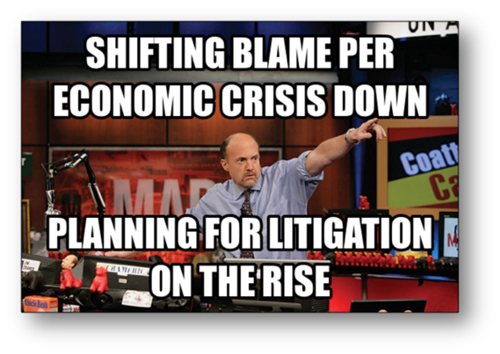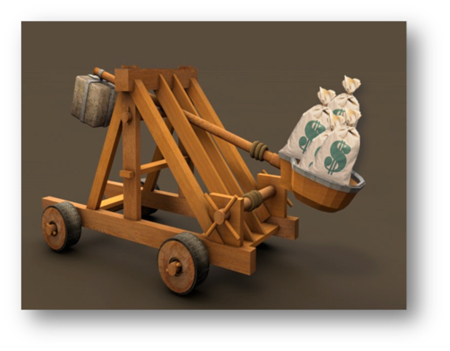 by Ryan H. Flax
by Ryan H. Flax
(Former) Managing Director, Litigation Consulting
A2L Consulting
Over the last few years we’ve seen a lot of litigation brought under a variety of auspices, but largely directed to the same thing: plaintiffs blaming their business partners for failures brought on by the failed economy. Some examples include a contract dispute where less than the projected product sales were reaped on expensive, luxury medical machines because hospitals didn’t want to buy them, environmental / bankruptcy claims alleging fraud where a spun-off company failed because of decreased housing demands, and fraud claims where investors made risky investments without protections and lost big. What each of these have in common is that, had the economy not tanked right around the time the alleged damage was inflicted upon the plaintiff (that is, around 2008-2009), there would likely have been no problem, no injury, and no lawsuit. Also common is that the plaintiffs in these cases can’t sue the economy, but they can sue their business partners.
 But, good news! In case you’d not heard, the economy is getting pretty good now (or at least improving). Even though the U.S. jobless rate isn’t what we want it to be (still hovering just below 8%), the economy at large is feeling comfortable enough for the U.S. Federal Reserve to announce that it will start rolling back its stimulus programs and will let the U.S. economy try to walk on its own. So, the question everyone in the legal field is asking is: how will this improvement affect how corporate America will spend its money in litigation?
But, good news! In case you’d not heard, the economy is getting pretty good now (or at least improving). Even though the U.S. jobless rate isn’t what we want it to be (still hovering just below 8%), the economy at large is feeling comfortable enough for the U.S. Federal Reserve to announce that it will start rolling back its stimulus programs and will let the U.S. economy try to walk on its own. So, the question everyone in the legal field is asking is: how will this improvement affect how corporate America will spend its money in litigation?
My prediction is that corporate budgets, including those of their legal divisions, will expand, companies will be willing to spend more money asserting and defending their legal rights, and more big-budget and high stakes litigation will result. What’s big budget litigation? It’s litigation that will likely cost several million to execute and that is less reactive or defensive litigation and more proactive and aggressive litigation. Falling into this category are suits in intellectual property, antitrust, environmental law, and government contracts. I may be leaving some practice areas out here, but these are case-types that are expensive and time-consuming to assert and defend. They are discovery-intensive, complicated, and will usually be vigorously defended.
Even in January of this year (2013), Law.com predicted an increase in trade secret litigation, antitrust litigation, white-collar crime enforcement/defense, labor and employment litigation, government contracts litigation, patent litigation, environmental litigation, class actions, and ITC cases. Not each of these fits my definition of big-budget litigation, but most do.
 Interestingly, the law firm Crowell & Moring made a very similar forecast for 2013 litigation trends. Crowell emphasized the need for corporate in-house counsel to take “a more proactive approach” to their legal needs. Crowell observed that the number of antitrust case increased from 2011 to 2012 at a rate of about 50%. Crowell further observed that patent cases involving non-practicing entities (NPEs or “patent trolls”) increased by 129% from 2011 to 2012. Even taking the “troll” issue off the table, for example, the increase in patent litigation over mobile device technology is apparent even to the casual observer.
Interestingly, the law firm Crowell & Moring made a very similar forecast for 2013 litigation trends. Crowell emphasized the need for corporate in-house counsel to take “a more proactive approach” to their legal needs. Crowell observed that the number of antitrust case increased from 2011 to 2012 at a rate of about 50%. Crowell further observed that patent cases involving non-practicing entities (NPEs or “patent trolls”) increased by 129% from 2011 to 2012. Even taking the “troll” issue off the table, for example, the increase in patent litigation over mobile device technology is apparent even to the casual observer.
The law firm Morgan, Lewis & Bockius LLP predicts significant increases in litigation involving technology; not necessarily just over patents. Morgan identified data security and privacy, government investigations, counterfeit merchandise, design patents, and trade secret misappropriation as hot-spots for 2013.
The law firm Fulbright & Jaworski LLP surveyed almost 400 in-house attorneys to identify and predict trends in litigation for 2013 – the great majority of those surveyed attorneys were either corporate general counsel or in charge of litigation. These decision-making in-house counsel (from the energy, engineering/construction, financial services, healthcare, insurance, manufacturing, real estate, retail, and technology industries) indicated that they expected an increase in litigation. They indicated that, while contract, labor, and personal injury disputes were the most numerous pending cases against U.S. companies, they experienced and expect increases in IP lawsuits, class actions, and privacy and data protection lawsuits.
So, what we see is a lot of groups with their fingers on the pulse of the litigation-economy in the U.S. predicting more litigation and bigger litigation now and in the near future. It’s true that the legal “industry” generally moves a tick slower than the economy at large, but I suggest you get ready for more work. It's what we're doing.






Leave a Comment